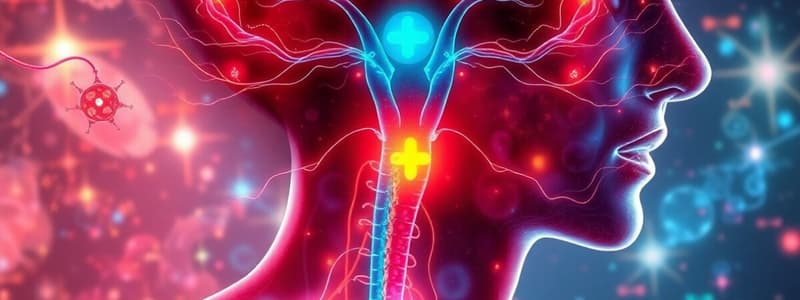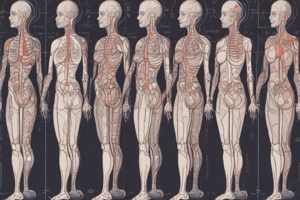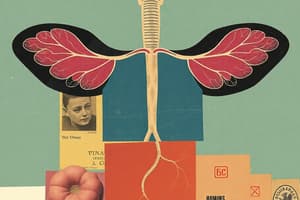Podcast
Questions and Answers
Which gland is primarily responsible for controlling the functions of other endocrine glands?
Which gland is primarily responsible for controlling the functions of other endocrine glands?
- Thyroid gland
- Adrenal gland
- Pituitary gland (correct)
- Parathyroid gland
What role do the parathyroid glands play in the body?
What role do the parathyroid glands play in the body?
- They regulate calcium balance. (correct)
- They regulate blood pressure.
- They monitor metabolism.
- They produce insulin.
Diabetes insipidus is primarily caused by a deficiency of which hormone?
Diabetes insipidus is primarily caused by a deficiency of which hormone?
- Cortisol
- Antidiuretic hormone (ADH) (correct)
- Insulin
- Thyroxine
Cushing's syndrome is associated with an excess of which hormone?
Cushing's syndrome is associated with an excess of which hormone?
Which endocrine gland is involved in regulating metabolism through hormone secretion?
Which endocrine gland is involved in regulating metabolism through hormone secretion?
The reproductive organs in the endocrine system include which of the following?
The reproductive organs in the endocrine system include which of the following?
Which of the following is NOT a disorder related to endocrine function?
Which of the following is NOT a disorder related to endocrine function?
Which hormone is primarily involved in the syndrome of inappropriate antidiuretic hormone secretion (SIADH)?
Which hormone is primarily involved in the syndrome of inappropriate antidiuretic hormone secretion (SIADH)?
Which sign is NOT typically associated with excess cortisol levels?
Which sign is NOT typically associated with excess cortisol levels?
What is a primary cause of neurogenic diabetes insipidus?
What is a primary cause of neurogenic diabetes insipidus?
Which feature is NOT characteristic of Type 1 diabetes mellitus?
Which feature is NOT characteristic of Type 1 diabetes mellitus?
Which condition is associated with vasopressin deficiency?
Which condition is associated with vasopressin deficiency?
Which of the following is NOT a sign of diabetes insipidus?
Which of the following is NOT a sign of diabetes insipidus?
What is the primary role of the adrenal glands?
What is the primary role of the adrenal glands?
What major metabolic disturbance characterizes diabetes mellitus?
What major metabolic disturbance characterizes diabetes mellitus?
Which drug is commonly associated with nephrogenic diabetes insipidus?
Which drug is commonly associated with nephrogenic diabetes insipidus?
Which hormone is produced by the pancreas to lower blood sugar levels?
Which hormone is produced by the pancreas to lower blood sugar levels?
What hormonal feedback mechanism is described by increased secretion inhibiting its own production?
What hormonal feedback mechanism is described by increased secretion inhibiting its own production?
What function does the endocrine system NOT primarily regulate?
What function does the endocrine system NOT primarily regulate?
Hyperthyroidism is most commonly associated with which condition?
Hyperthyroidism is most commonly associated with which condition?
Which of the following electrolytes is NOT typically regulated by the endocrine system?
Which of the following electrolytes is NOT typically regulated by the endocrine system?
What is a role of testosterone in the male reproductive system?
What is a role of testosterone in the male reproductive system?
Which hormone directly affects growth and development during adolescence?
Which hormone directly affects growth and development during adolescence?
What condition may result from insufficient thyroid hormone production?
What condition may result from insufficient thyroid hormone production?
What role do hormones play in maintaining homeostasis?
What role do hormones play in maintaining homeostasis?
Which of the following is NOT a cause of hyperthyroidism?
Which of the following is NOT a cause of hyperthyroidism?
What is a significant consequence of excessive iodine intake?
What is a significant consequence of excessive iodine intake?
Which condition is classified as primary hypothyroidism?
Which condition is classified as primary hypothyroidism?
In which situation might hyperthyroidism occur in a person without prior history?
In which situation might hyperthyroidism occur in a person without prior history?
Which of these symptoms is commonly associated with hypothyroidism?
Which of these symptoms is commonly associated with hypothyroidism?
What factor is a recognized cause of secondary hypothyroidism?
What factor is a recognized cause of secondary hypothyroidism?
Which of the following statements regarding Addison's disease is accurate?
Which of the following statements regarding Addison's disease is accurate?
What symptom is typically experienced by individuals with hyperthyroidism?
What symptom is typically experienced by individuals with hyperthyroidism?
Which factor contributes to the increased secretion of thyroid hormones in hyperthyroidism?
Which factor contributes to the increased secretion of thyroid hormones in hyperthyroidism?
Which of the following is a common symptom of both hyperthyroidism and hypothyroidism?
Which of the following is a common symptom of both hyperthyroidism and hypothyroidism?
What is a defining characteristic of Addison’s disease?
What is a defining characteristic of Addison’s disease?
What major consequence results from a deficiency of corticosteroids in Addison's disease?
What major consequence results from a deficiency of corticosteroids in Addison's disease?
During an Addisonian crisis, which of the following symptoms is not commonly presented?
During an Addisonian crisis, which of the following symptoms is not commonly presented?
Which of the following is a cause of Cushing's syndrome?
Which of the following is a cause of Cushing's syndrome?
What symptom is least likely to be associated with Addison’s disease?
What symptom is least likely to be associated with Addison’s disease?
In Cushing's syndrome, the prolonged exposure to excess glucocorticoids primarily causes which of the following effects?
In Cushing's syndrome, the prolonged exposure to excess glucocorticoids primarily causes which of the following effects?
Which hormone's deficiency may lead to decreased hair growth in axillary and pubic areas during Addison's disease?
Which hormone's deficiency may lead to decreased hair growth in axillary and pubic areas during Addison's disease?
What is a common reason for secondary adrenal hypofunction?
What is a common reason for secondary adrenal hypofunction?
Which of the following correctly describes the pathological process of Cushing's syndrome?
Which of the following correctly describes the pathological process of Cushing's syndrome?
Which condition occurs when there is a significant physical stress without adequate corticosteroid coverage in patients with Addison's disease?
Which condition occurs when there is a significant physical stress without adequate corticosteroid coverage in patients with Addison's disease?
Flashcards
Endocrine Glands
Endocrine Glands
Glands that secrete hormones directly into the bloodstream.
Exocrine Glands
Exocrine Glands
Glands that secrete substances onto the body's surface or into a body cavity.
What does the pituitary gland control?
What does the pituitary gland control?
The pituitary gland controls many functions of other endocrine glands.
What is the thyroid gland's role?
What is the thyroid gland's role?
Signup and view all the flashcards
What do parathyroid glands regulate?
What do parathyroid glands regulate?
Signup and view all the flashcards
What are the major components of the endocrine system?
What are the major components of the endocrine system?
Signup and view all the flashcards
What are hormones?
What are hormones?
Signup and view all the flashcards
How do hormones affect target cells?
How do hormones affect target cells?
Signup and view all the flashcards
Hyperthyroidism Cause: Iodine
Hyperthyroidism Cause: Iodine
Signup and view all the flashcards
Hyperthyroidism Cause: Autoimmunity
Hyperthyroidism Cause: Autoimmunity
Signup and view all the flashcards
Hyperthyroidism Cause: Medications
Hyperthyroidism Cause: Medications
Signup and view all the flashcards
Hyperthyroidism: Goiter Formation
Hyperthyroidism: Goiter Formation
Signup and view all the flashcards
Common Hyperthyroidism Symptoms
Common Hyperthyroidism Symptoms
Signup and view all the flashcards
Hypothyroidism: Cause: Pituitary Failure
Hypothyroidism: Cause: Pituitary Failure
Signup and view all the flashcards
Hypothyroidism: Cause: Iodine Deficiency
Hypothyroidism: Cause: Iodine Deficiency
Signup and view all the flashcards
Hypothyroidism: Common Symptoms
Hypothyroidism: Common Symptoms
Signup and view all the flashcards
Hypothyroidism: Primary vs. Secondary
Hypothyroidism: Primary vs. Secondary
Signup and view all the flashcards
Addison's Disease: Adrenal Hypofunction
Addison's Disease: Adrenal Hypofunction
Signup and view all the flashcards
Primary Adrenal Hypofunction
Primary Adrenal Hypofunction
Signup and view all the flashcards
Secondary Adrenal Hypofunction
Secondary Adrenal Hypofunction
Signup and view all the flashcards
Addison's Disease
Addison's Disease
Signup and view all the flashcards
Cortisol Deficiency
Cortisol Deficiency
Signup and view all the flashcards
Aldosterone Deficiency
Aldosterone Deficiency
Signup and view all the flashcards
Androgen Deficiency
Androgen Deficiency
Signup and view all the flashcards
Addisonian Crisis
Addisonian Crisis
Signup and view all the flashcards
Cushing's Syndrome
Cushing's Syndrome
Signup and view all the flashcards
What causes Cushing's Syndrome?
What causes Cushing's Syndrome?
Signup and view all the flashcards
Pathophysiology of Cushing's Syndrome
Pathophysiology of Cushing's Syndrome
Signup and view all the flashcards
What are the primary symptoms of Cushing's Syndrome?
What are the primary symptoms of Cushing's Syndrome?
Signup and view all the flashcards
Diabetes Insipidus
Diabetes Insipidus
Signup and view all the flashcards
What causes Diabetes Insipidus?
What causes Diabetes Insipidus?
Signup and view all the flashcards
Diabetes Mellitus
Diabetes Mellitus
Signup and view all the flashcards
What are the types of Diabetes Mellitus?
What are the types of Diabetes Mellitus?
Signup and view all the flashcards
What is the pathophysiology of Type 1 Diabetes?
What is the pathophysiology of Type 1 Diabetes?
Signup and view all the flashcards
Adrenal Glands Location
Adrenal Glands Location
Signup and view all the flashcards
Adrenal Glands Function
Adrenal Glands Function
Signup and view all the flashcards
Pancreas Location
Pancreas Location
Signup and view all the flashcards
Pancreas Function
Pancreas Function
Signup and view all the flashcards
Reproductive Organs Function (Male)
Reproductive Organs Function (Male)
Signup and view all the flashcards
Endocrine System's Main Role
Endocrine System's Main Role
Signup and view all the flashcards
Key Functions of Endocrine Glands
Key Functions of Endocrine Glands
Signup and view all the flashcards
Hormones: Key Messengers
Hormones: Key Messengers
Signup and view all the flashcards
Hormonal Regulation: Feedback Loops
Hormonal Regulation: Feedback Loops
Signup and view all the flashcards
Hyperthyroidism: Overactive Thyroid
Hyperthyroidism: Overactive Thyroid
Signup and view all the flashcards
Study Notes
Endocrine System Disorders
- Disorders
- Hyperthyroidism & Hypothyroidism
- Addison's disease (adrenal hypofunction)
- Cushing's syndrome
- Diabetes insipidus
- Diabetes mellitus
- Syndrome of inappropriate antidiuretic hormone secretion (SIADH)
Endocrine Glands
- Components of the endocrine system
- Pituitary gland
- Thyroid gland
- Parathyroid glands
- Adrenal glands
- Pancreas (endocrine and exocrine)
- Reproductive organs (ovaries and testes)
- Pineal gland
- Hypothalamus
Gland Function
- Location & Function
- Pituitary: Below the brain, controls other endocrine glands.
- Thyroid: Front of neck (below larynx), plays a role in metabolism.
- Parathyroid: Front of neck (below larynx), regulates calcium balance.
- Adrenal: On top of kidneys, works with hypothalamus/pituitary, maintains blood pressure & regulates metabolism.
- Pancreas: Across back of abdomen, behind stomach, role in digestion & hormone production (insulin and glucagon regulate blood sugar.)
- Reproductive organs: Female and male reproductive system. Produce egg cells/estrogen/progesterone, testosterone/sperm.
Major Functions
- Regulates metabolism, reproduction, fluid/electrolyte balance, optimal internal environment (blood glucose regulation), and growth/development.
Hormones
- Action of hormones
- Regulate homeostasis/reproduction/growth/development/metabolism
- Delivered to receptors on their specific target organs (feedback loops maintain balanced hormone levels)
- Mechanism of secretion regulated by positive/negative feedback. Increased levels of one hormone inhibit the secretion, decreased level stimulates.
Hyperthyroidism
- Definition
- Metabolic imbalance with overproduction of thyroid hormone (thyrotoxicosis).
- A common form is Graves' disease.
- Causes
- Excessive iodine intake
- Defect in suppressor T-lymphocyte function (autoimmune)
- Medications (like amiodarone)
- Stress (surgery/infection/toxemia of pregnancy)
- Nodules/tumors
Hyperthyroidism: Pathophysiology
- Mechanism
- Autoimmune disorder where antibodies mimic the role of TSH, increasing thyroid hormone secretion.
- Acute intoxication with exogenous hormones, or high iodine loads from drugs.
- Signs/Symptoms
- Enlarged thyroid (goiter), apprehension, heart palpitations, weight loss, intolerance to heat/sweating.
Hypothyroidism
- Definition
- Endocrine dysfunction with decreased/absent secretion of thyroid hormones.
- Causes
- After thyroidectomy/radiation
- Pituitary gland failure to produce TSH
- Iodine deficiency
- Medication
Hypothyroidism: Pathophysiology
-
Mechanism
- Primary: Thyroid injury from autoimmune disorder or adverse drug reaction.
- Secondary: Damage to hypothalamus/pituitary gland causes decreased thyroid stimulation (decline in TSH production/release)
-
Signs/Symptoms
- Weakness/fatigue/forgetfulness/sensitivity to cold/unexplained weight gain/coarse hair/skin, neurological changes, cardiovascular symptoms.
Addison's Disease (Adrenal Hypofunction)
- Definition
- Adrenal gland hypofunction.
- Types
- Primary: From within the gland (e.g., adrenalectomy), decreased secretion of mineralocorticoids/glucocorticoids/androgens.
- Secondary: From outside the gland (e.g., impaired pituitary secretion), decreased glucocorticoid secretion.
- Pathophysiology Involves all zones of the cortex, causing deficiencies in adrenocortical secretions, causing low blood glucose. Aldosterone deficiency causes increased renal sodium loss & enhances potassium reabsorption & androgen deficiency can decrease hair growth in armpits and pubic areas.
- Signs and Symptoms
- Hyperpigmentation/low blood sugar/fatigue/malaise/loss of appetite/addisonian crisis (life-threatening physical stress & trauma)
Cushing's Syndrome
- Definition
- A cluster of clinical abnormalities caused by excessive adrenocortical hormones (especially cortisol).
- Causes
- Anterior pituitary hormone (corticotropin) excess
- Autonomous, ectopic corticotropin secretion by a tumor; excessive glucocorticoid administration (prolonged use).
- Pathophysiology
- Prolonged excess glucocorticoids; cortisol excess results in anti-inflammatory effects & excessive catabolism of protein/peripheral fat to support hepatic glucose production. Excess cortisol suppresses the hypothalamic-pituitary-adrenal axis.
- Signs and Symptoms
- Diabetes mellitus, muscle weakness, purple striae/facial plethora, buffalo hump/moon face/truncal obesity.
Diabetes Insipidus
- Definition
- Water metabolism disorder; deficiency of circulating vasopressin (ADH) or renal resistance to ADH.
- Causes
- Acquired, familial, idiopathic, neurogenic, or nephrogenic
- Associated with stroke, hypothalamic/pituitary tumors, cranial trauma or surgery; certain drugs (like lithium).
- Pathophysiology Neurogenic is inadequate response to ADH in response to plasma osmolarity. Nephrogenic diabetes insipidus is due to inadequate renal response to ADH. Psychogenic is due to extremely large fluid intake.
- Signs/Symptoms
- Polydipsia/polyuria (urine output 2-20 L/day)/Nocturia/sleep disturbance/fatigue/ low urine specific gravity (< 1.006).
Diabetes Mellitus
- Definition -Metabolic disorder; characterized hyperglycemia due to lack of insulin, lack of insulin effect, or both.
- Types
- Type 1: Absolute insulin insufficiency
- Type 2: Insulin resistance with varying degrees of insulin secretory defects
- Gestational: Glucose intolerance during pregnancy.
- Causes
- Environmental factors (infection/diet/toxins/stress)
- Heredity
- Lifestyle changes
Diabetes Mellitus: Pathophysiology
- Type 1 triggering event (possibly viral) causes production of autoantibodies against beta cells of pancreas, leading to insulin deficiency.
- Type 2 is a chronic disease due to impaired insulin secretion, inappropriate hepatic glucose production, or peripheral insulin receptor insensitivity.
- Gestational occurs when placental hormones oppose insulin action leading to insulin resistance.
- Signs and Symptoms
- Polyuria/polydipsia/polyphagia/weight loss/thirst/blurred vision/fatigue.
Syndrome of Inappropriate Antidiuretic Hormone Secretion (SIADH)
- Definition
- A condition where the body produces too much antidiuretic hormone (ADH).
- Pathophysiology
- Excessive ADH leads to excessive water reabsorption from the distal convoluted tubule & collecting ducts which causes hyponatremia/normal to slightly increased extracellular fluid volume. This can lead to cerebral edema, brain herniation.
- Causes
- Oat cell carcinoma/drugs that increase/potentiate ADH/central nervous system disorders/brain tumor/brain injury, infections, stroke.
- Signs/Symptoms
- Thirst/anorexia/fatigue/lethargy/weight gain/edema/water retention, decreased urine output/hyponatremia.
Studying That Suits You
Use AI to generate personalized quizzes and flashcards to suit your learning preferences.




